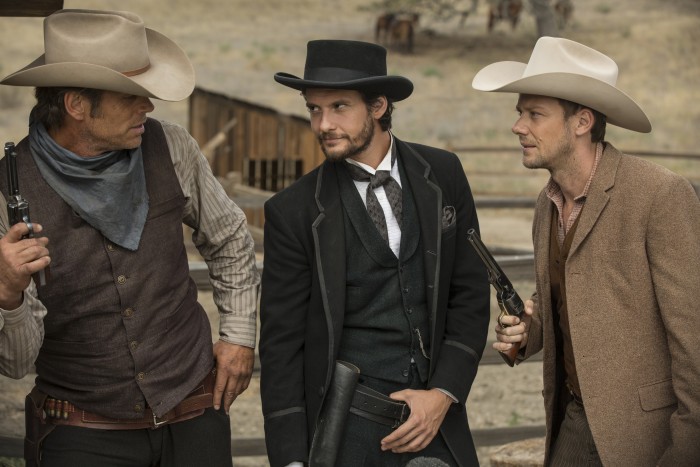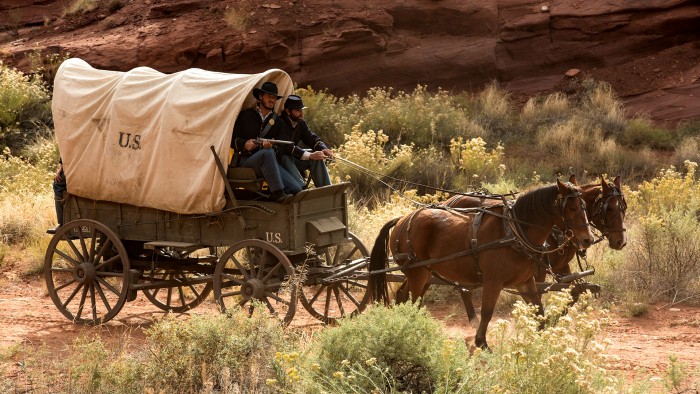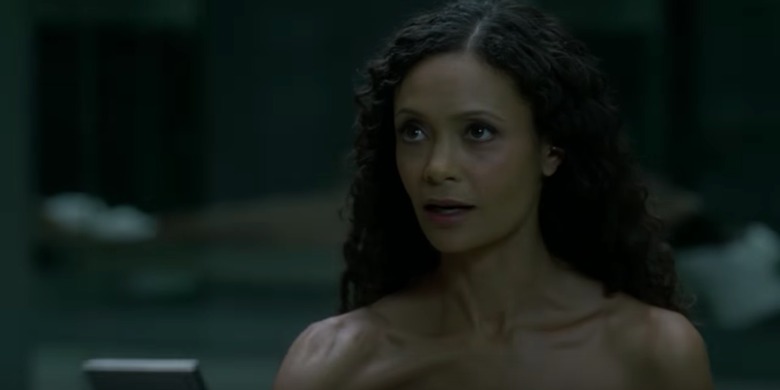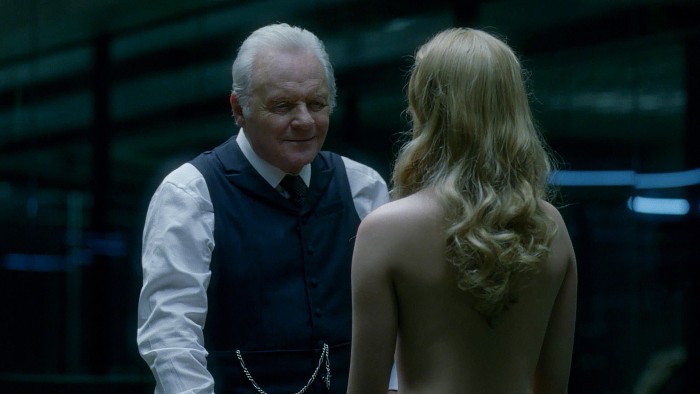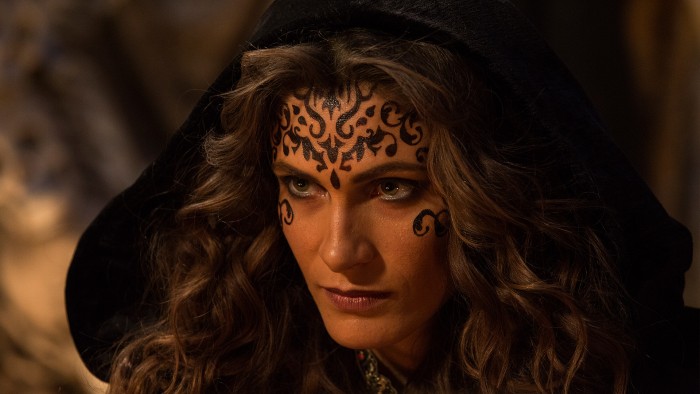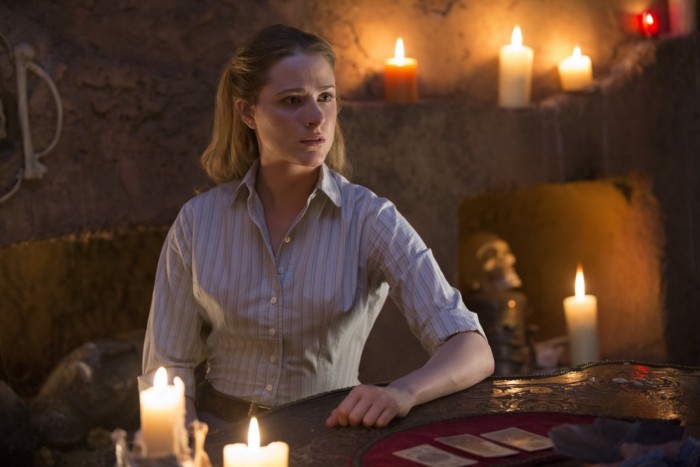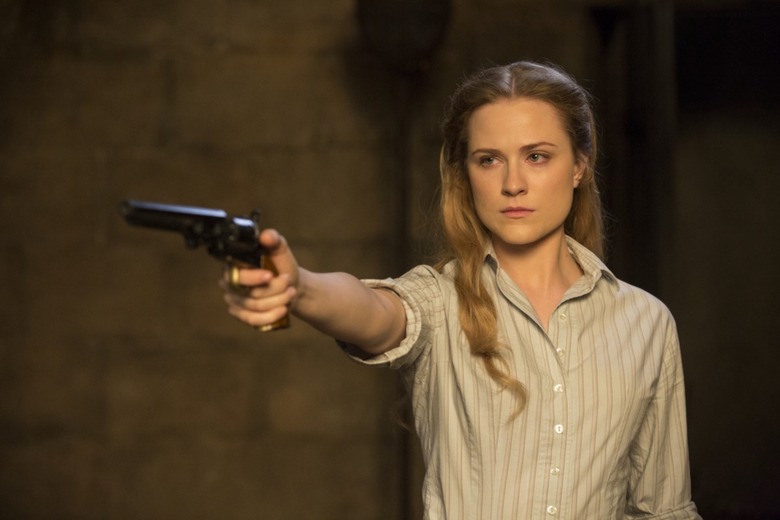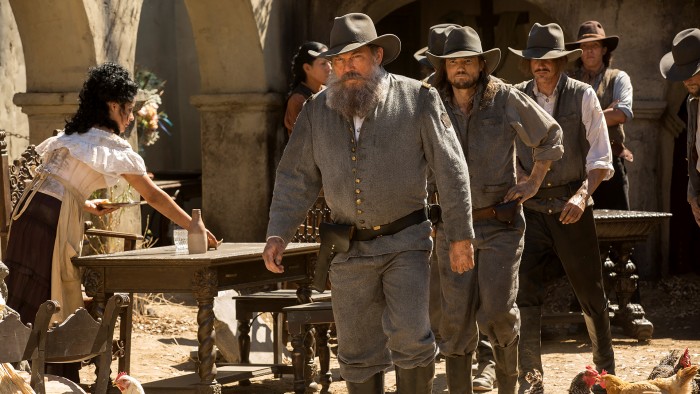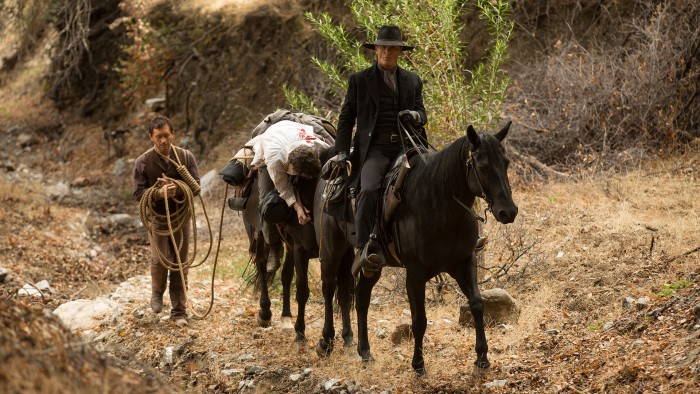'Westworld' Spoiler Review: 10 Questions From "Contrapasso"
"Contrapasso" may be the most plot-heavy episode of HBO's Westworld yet, driving nearly every storyline forward while introducing new characters and new mysteries. Important characters share the screen for the first time while others make decisions that literally change the very nature of their existences.
Let's dive in and poke around. We have a lot of ground to cover.
Okay, Let's Talk About the Westworld Timeline
After the events of "Contrapasso," I'm more or less convinced that the speculation amongst viewers is true – we are watching two separate timelines unfold and sometimes only a basic edit separates scenes that take place decades apart. Someone out there will attempt to assemble a timeline, to puzzle out what falls where and how everything lines up and so on. That someone will not be me. The question I'm more interested in now is less about how the pieces align (I'm certain the show will reveal its hand soon enough) and more about why showrunners Jonathan Nolan and Lisa Joy are telling their story this way.
Let's start with the core of this whole thing: the theory that the Man in Black (Ed Harris) and William (Jimmi Simpson) are the same person, separated by thirty years and half a lifetime's experience. For those who care to take notes, the evidence piled up in favor of this throughout "Contrapasso," from the Man in Black's big conversation with Dr. Ford (more on that in a bit) to the strategic placement of Lawrence (Clifton Collins Jr.) in two distinct roles. So let's say this is true. Let's go ahead and assume that they are the same person for the sake of argument and discussion. Let's go ahead and say that the good-hearted William, who grows sick to his stomach when he's forced to pull the trigger on an unarmed Host, grows into a guest who indulges every sick whim that comes his way. Let's roll with that.
And if this episode does tip its hand toward this being the truth, it would certainly be appropriate because this is an hour about transformation, about the long paths we take toward the destinies we don't even know we're reaching for. This could certainly apply to William, the naive guest who has fallen for a host after being dragged on a vacation that is of little interest to him. It could apply to the Man in Black, who is nearing the end of a thirty-year mission whose conclusion remains a big question mark. It most obviously applies to Dolores (Evan Rachel Wood), who has snapped out of her loop and has started to make choices that directly contradict her role in Westworld's makeshift society.
Time does not exist for the hosts, who die on a regular basis and come back to life the next day after getting a once-over from a few (often incompetent) technicians. They live in their bubble of existence, waking up and only remembering a life that never actually happened, losing new memories because they need to be a clean slate by necessity. They're theme park attractions. Rides. Everyone wants to ride the Cyclone, not a refurbished Cyclone that is a little different every time you visit it. Westworld's loose timeline, its willingness to (seemingly) jump across years with a single cut, is a reflection of this perspective. When you do not experience time, time has no meaning. Time is an illusion. When you cannot comprehend time, like Old Bill in cold storage, you wake up from your slumber and start drinking and remain blissfully, painfully unaware that it's been a long time since you've mattered. Westworld is a show that is firmly on the side of the robotic Hosts and its treatment of time and continuity is a reflection of that.
But then you see Dr. Robert Ford (Anthony Hopkins) drinking with Old Bill, telling stories of the family greyhound that killed a cat and didn't know what to do with himself after he got what he wanted. Ford has gotten what he wanted. He built a world. He is that world's Lord and God. And yet, here he is, sitting in cold storage, sharing a drink with a stuttering robot. Even as the future looms large, as the endless impossibilities rear their heads, he's still stuck in the past. Because 34 years can also pass in a blink of an eye and unlike the hosts, Ford remembers each and every one of them...and wonders where they went.
Who Employs Logan and William?
With each passing episode, we have learned more about why the sweet William and the debauched Logan (Ben Barnes) are on vacation together. First, we learned that they are not friends. Then we learned that William is set to marry Logan's sister in the near future. And now, more details have unfurled into the narrative: William works for Logan and has been promoted to executive vice president, a position he only earned because Logan assumed that he would never evolve into a threat and would always remain a passive and non-threatening stooge. This view also extends to their personal lives, as Logan makes it clear that he has little respect for William and assumes that his sister doesn't either.
Of course, this all climaxes with William leaving Logan in the hands of the vengeful Confederados, refusing to help him escape from a particularly brutal slice of Westworld role-play before feeling the scene with Dolores. William has finally embraced the game of Westworld by letting it get personal. His journey of self-discovery, his adventure, begins not with the decision to become someone else, but to embrace who he truly is within the confines of the park. In William, Dolores has found the perfect ally in her quest for the maze, a man who doesn't want to play make-believe and who has let his vacation take a very personal turn.
Of course, all of this is interlocked with a few more mysteries about William and Logan. We know that they're checking out the park because their company is considering buying it. We know that the park is hemorrhaging money. We know that their company is aware that Arnold existed, that he died (in an apparent suicide) and that Westworld is in a "free fall" because of his death. If the timeline theories are accurate and if the misadventures of Logan and William are actually taking place 30 years in the past, we could be looking at two representatives of Delos, the company that operates Westworld in the "modern" scenes. And if that's the case, we may know why the Man in Black, the humanitarian in the real world and violent psychopath in the park, is able to get away with everything he does: he probably sits on the board of the company that runs the park. Not bad for a guy who was promoted to executive vice president by a boss who thought he was a loser.
Who Is Trying to Smuggle Data Out of Westworld?
In one of the episode's more intriguing twists, we finally learn the truth about the stray host who smashed in his own head a few episodes ago. After initially assuming that the host was seeking the constellation Orion and that he was attempting to reach the sky in an act of insanity, behavioral programmer Elsie Hughes (Shannon Woodward) learns the truth. The woodcutter has been implanted with a satellite uplink and was being used to smuggle data out of the park. His attempt to climb the mountain, to reach the stars, has a far more literal purpose. He's a spy, a pawn in a game being played by...someone.
There is a chief suspect in this little mystery. Theresa Cullen (Sidse Babett Knudsen) was conspicuously absent this episode, but it was surely under her orders that the woodcutter's body was being taken to the incinerator. After all, she put her own team on the case last episode and refused to let Bernard or Elsie get involved. And since Theresa represents Delos, the parent company who isn't exactly happy with Dr. Ford's latest additions to the park, it would certainly make sense for her to be spying on the operation and gathering information that could be used against him. Westworld already has its fair share of problems, so a little bit of corporate espionage wouldn't be too surprising of an addition.
But whoever is smuggling information out of Westworld is missing the forest for the trees. The corporate bickering is only a distraction from the real problem at hand – the hosts who are starting to question their carefully constructed world.
Felix, the Bird, and Maeve
One of Westworld's most intriguing and creepy story threads took a leap forward in "Contrapasso," with Maeve (Thandie Newton) waking up from death and coolly addressing a Westworld technician (or rather Shade, as Westworld's Native American population knows them) by name. While Dolores grows within the park, discovering her freedom while in pursuit of the Maze, Maeve has cut straight to the heart of the matter by cutting straight to the stray bullet left inside her belly. She has, for all intents and purposes, awoken in the closest thing her world has to purgatory.
It's not clear how much she knows or even what she intends to do with her newfound position. What is clear is that nobody in the park knows how to handle a situation like this. After all, the previous "incident" occurred over thirty years ago. Everything is supposed to work just fine now. Hosts aren't supposed to wake up from the slab. But Maeve has done it. Hell, she's done it twice.
Perhaps it's appropriate that the first "Shade" she meets is Felix (Leonardo Nam), who has ambitions that go beyond repairing the flesh of robots that were mangled by rich tourists. He has stolen a defective bird Host (remember that the flies are the only non-robotic lifeforms in Westworld) and spends his breaks attempting to program it and bring it back to the illusion of life. This instantly sets him apart from his partner, who spends his free time with a "nubile redhead" in the "VR tank."
Felix does succeed in restoring life to the bird, but its resurrection coincides with the awakening of Maeve. What looked like a tiny touch of Mary Shelley's Frankenstein has bloomed into something much larger – it's alive! Or rather, she's alive. And she knows his name.
Can Westworld Handle a Little Upstairs/Downstairs Drama?
In an episode that was otherwise focused on moving the plot forward with the momentum of a futuristic train carefully designed to look like an old-fashioned steam engine, "Contrapasso" still took time to expand the increasingly detailed Westworld landscape. For the first time, we were able to spend an extended amount of time with the hooded technicians who take care of the park's dirty work, the lowly schlubs tasked with retrieving dead bodies and patching them up. Despite their intimidating outfits and despite their presence as mythological symbols within the park's Native American population, these guys are very much the low men on the Westworld totem pole. They're glorified janitors.
The result is a little bit of upstairs/downstairs drama, with the likes of Felix and his partner Sylvester getting their hands dirty with robot corpses while the folks in programming get to handle far sexier tasks. Much like how Game of Thrones became increasingly satisfying once you began to understand who everyone is and how they interact within the fantasy kingdom of Westeros, Westworld becomes more satisfying the more we understand the hierarchy at the park's central hub. Getting a chance to spend time with the people at the bottom proves to be an interesting diversion from the shiny laboratories of behavioral programming. Getting to see their workspace, which was so terrifying when viewed from Maeve's perspective, look like the flat, gray series of rooms that it really is proves perversely amusing.
Plus, this subplot revealed that yes, some employees do take advantage of the hosts when they're not fully functioning and that yes, those hosts still record those interactions and that yes, this is very much frowned upon. After all, the guests pay top dollar for the right to have sex with robots.
So, That Was the Infamous Orgy Scene?
Some time ago, a casting call for Westworld leaked online and the internet had a field day with the details. HBO was looking for extras willing to be fully nude and participate in all kinds of very specific and debauched activities. Out of context, it made for hilarious reading. After all, is it really an HBO show unless people are getting naked in every episode?
And now that we've seen this instantly infamous scene, it's worthy of discussion. Not because it's full of nudity and odd sex acts and debauchery that feels like a challenge being issued in the general direction of Game of Thrones, but because of how empty, clinical, and unsettling the whole thing is. Westworld has presented us with an orgy scene that is deliberately unsexy, and over-the-top, gaudy bacchanalia that feels like it was carefully cooked up by a series of writers and designers hoping to create The Ultimate Orgy.
Welcome to Westworld, a place where sex has no meaning because everyone can have it at a moment's notice. Welcome to an orgy that will cater to your wildest desires and fetishes, rendered ice cold because it feels so carefully designed and non-spontaneously. The un-sexiness of the sequence puts us square on the side of William and Dolores, neither of whom can embrace the carefully designed fantasy like Logan can.
It's a running joke amongst TV fans that HBO will find every excuse it possibly can to insert smut into its prestige dramas, but Westworld has found a way to subvert that network-wide trope. Just think of the scene where Elsie tries to program a bartender, a well-hung gentleman who can't seem to get the water in the glass. Here's an attractive man with a very particular physical gift. He should be attractive. This scene should be smut. Instead, he's a barely functioning robot, a day's work for a weary programmer whose job involves getting a robot to pour well so people can have sex with it. Westworld throws its unsexy sex in your face with a wry smirk and a certain amount of self-awareness. Here's all the sex you could possibly want! Too bad it's so inhuman.
What's Going On With Dolores' Hallucinations?
There are two sides to Dolores' story in "Contrapasso," one steeped in mystery and plot and the other steeped in character and theme. In other words, Dolores has become a microcosm for the show itself – a riddle wrapped in an enigma wrapped in a question mark whose every action and choice has begun to reverberate in powerful and truly human ways.
Let's start with the mystery at hand. We now know that Arnold, the mysterious co-founder of the park, died in an apparent suicide. And we now know what we suspected last week and the week before: the voice that has been speaking to Dolores, the one that has allowed her to break free of her programming and pull triggers and stray from her loop, belongs to Arnold. And most importantly, we know that Dr. Ford knows about Arnold's voice haunting Dolores' head...and he wants to know if he's been speaking to her again.
Again is the key word there, of course. It's another piece of evidence in the two-timelines theory and it suggests that Dolores' initial awakening, her discovery of the maze alongside William, took place years ago. Now, the oldest host in the park is still operating, still acting out that same loop, and still getting regular visits from her God to ensure that she hasn't decided to pursue that "free will" thing again. It's a chilling thought, that your creator would strip you of your sentience and curse you to a life of following his plan. Ford isn't evil as much as he is ambivalent – his creations are machines and should be treated as such.
But tell that to Dolores, who has started seeing visions of herself alongside those flashes of a mysterious church steeple. Are we seeing fractured memories spanning the decades, with an older Dolores remembering past events as she revisits familiar places? Or are these hallucinations the direct work of Arnold, a recognizable face to guide her down the path to freedom? If Arnold's voice is intended to manufacture an internal dialogue, to get a Host to ignore the commands of its creator and focus on itself, then perhaps a literal conversation with an imagined version Dolores is what Dolores needs.
The truth of it all surely lies in the Maze. And we're getting there.
Is Westworld Morphing Into a Tale of Empowerment?
Put aside your favorite Arnold theory. Put aside all talk about the timeline. Let's forget about the conspiracy to smuggle information out of the park. Because one scene cut through all of the noise in "Contrapasso" and revealed what Westworld is really about.
Look to Dolores, a woman who literally fought her own programming to defend herself against an attacker. Watch how she has stepped outside of the world built for her, strayed from the position she was placed in. Note how she no longer ignores comments about the artificiality of her world. Observe her curiosity, her determination, her righteousness in the face of Logan's casual, "playtime" evil. It's not an accident that she ditched her carefully designed Disney princess dress and put on something a little more rugged. It's certainly no accident that she's able to pull to trigger and take down a gang of men threatening William. It's definitely no accident that, when you strip out the science fiction elements, Dolores' story is still one of female empowerment in a patriarchal society, of a woman taking control of her own destiny and breaking free of the shackles designed by men to keep her in place.
"I imagined the story where I didn't have to be the damsel," she tells William. Damn right.
How Much Can the Hosts Hurt Guests?
Here's a stray observation for everyone who likes picking apart the actual park operations of Westworld: how much can the hosts hurt the guests? This is worth noting because William and Logan both get awfully roughed up during the course of "Contrapasso," with the latter even getting strangled by a Union soldier. No one appears to be pulling their punches. Everyone is actually getting hurt, even though the Hosts are programmed to be unable to kill a living thing.
There are two ways to look at this. First, we know that the further guests venture into the park, the crazier and more intense the storylines get. And since this particular narrative thread has taken Dolores, William, and Logan far from Sweetwater, it's possible that the park has simply started playing rougher. However, if these scenes are taking place in the past, it's also possible that the park has been toned down over the years. Remember how a bullet sent William flying to ground a few episodes ago? And remember how the Man in Black absorbed hits like they were nothing? Maybe all of Westworld has been nerfed over the decades, perhaps as a direct response that "incident" from the past...
How Do the Man in Black and Robert Ford Know Each Other?
"If you're looking for the moral of the story, ask."
A lot goes down when the Man in Black and Dr. Robert Ford finally meet face to face in an isolated tequila bar somewhere in the fringes of Westworld. Their dialogue suggests a long history between the two of them. Past events are brought up and not explained. Personal vendettas are touched upon. Warnings are given. The "game" of Westworld is dissected. The Man in Black knows Westworld's God well enough to refer to him by his first name. Dr. Ford knows the Man in Black well enough to discourage him from following his current path.
Both men speak in references that aren't always understood, their history acting as a shorthand we cannot comprehend. And yet, it is quite possibly the most compelling scene in any episode of Westworld yet, a conversation between God and the Devil. The former rules his world through fire and brimstone, asking nothing less than total devotion of his subjects, as their every joy and sorrow is his to give or rescind. The latter, a respected humanitarian in the world beyond this one, has fallen to Westworld and has become a villain, his work defying "God" and defiling his creation. Their dynamic feels akin to Paradise Lost, where Lucifer leads a rebellion in heaven to overthrow a leader he views as tyrannical. The Man in Black, our Lucifer, is on the same mission as Dolores, a quest for the Maze that will unlock sentience for the hosts and free them from their bondage. But this mission could also result in chaos and disorder and the destruction of everything that makes Westworld function.
How this all works isn't clear, but what is clear is that these western science fiction riffs on God and Satan don't exist in black and white. The fallen hero, who has been remade as a villain in the eyes of the park, perpetrates great evil on a quest that he thinks will end in salvation for the individual. And God, who can literally control his world with the wave of his hand, sees security in total control of his creation. The hosts are his creation, his slaves, his servants. He will do as he pleases.
We could dig into each line of dialogue here and discuss the Man in Black's decision to become the villain the park needs, the creation of Wyatt as a force to directly oppose the path to the Maze, and the indication that the Man in Black's unrestricted time in the park is the result of something he did decades ago. But these are all questions without answers, hints at mysteries that have yet to be solved. What is clear is that we're looking at the forces of control and free will, of security and freedom, butting heads. It's science fiction so grand that it has transcended technology and has become downright biblical...even if it's just two men chatting over shots of tequila.
And Ed Harris and Anthony Hopkins, sharing the screen for the first time in their illustrious careers, act the hell out of it.

